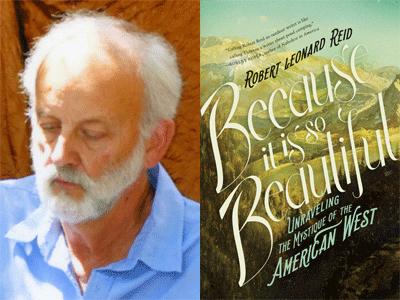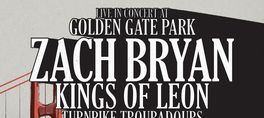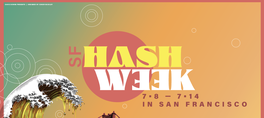Robert Leonard Reid discusses his lyrical new essay collection, Because It Is So Beautiful: Unraveling the Mystique of the American West.
Taking its title from an affecting speech given by renowned author Barry Lopez, Because It Is So Beautiful is a response to desperate questions surrounding the protection and preservation of America's wildlands. Lopez asserted that wilderness activists will never achieve the success they seek until they can testify before legislators that a certain river or mountain must be saved--not because of its economic importance or its recreational, historical, or scientific value, but because it is so beautiful. The words resonated with young mountaineer-musician-mathematician Robert Leonard Reid, who was struggling to understand his relationship to the world, to find his vision as a writer. What he learned on that long-ago evening is that to save a wilderness--or indeed even to live one's life--you must reach deep into your heart and find what is there, then speak it plainly and without shame. This belief is knit throughout the nineteen pieces in the collection, which include essays from Reid's previous books Arctic Circle, Mountains of the Great Blue Dream, and America, New Mexico, three essays that appear here in print for the first time, as well as revised and expanded versions of essays that appeared in Touchstone, The Progressive, and elsewhere.
Yes, every inch of the globe has been seen, mapped, photographed and measured, but is it known? Reid doesn't think so. To draw a circle and calculate its diameter is not to know the circle. These essays cast a wide net in their exploration of the natural world; from chronicling the perilous ascents of Mount Logan, Canada's tallest peak in "Intruders on a Lifeless Ridge," to "Ling-Ling Has Killed Another Baby"--a poem written from the perspective of the famous panda herself which leaves the reader questioning what it means to be captive, to bring life into this world, what it means to hold blame. "Journeys through Space and Time" brings forward echoes of the forced migration of the Dine (Navajo) people in his depiction of modern Gallup, New Mexico as a microcosm for the treatment of Native Peoples by the United States. A profound turn of poetic stream-of-consciousness comes in "The Fire and The Rose," in which the essay dives suddenly into an account of a bear encounter one moonlight night in the northern vastness of Yosemite National Park. Reid recounts how this story, over time, has changed from a spectacle to be shared for astonishment into the realization that a barrier had been breached that night, a light ignited. "Rebuilding the Clouds" unearths the nuclear bones and persistent mysticism beneath the New Mexican desert, proposing the idea that perhaps the most amazing thing about modern science is not the startling new view of the world it has given us, but its failure to efface the old view.
In this collection, Reid distinguishes himself from many science-based nature writers, using the natural world as a springboard for speculations and musings on the numinous and the sacred, injustice, homelessness, the plight of the Indians, and what pushes mountaineers to climb. Ranging in their settings from eastern New Mexico to northern Alaska, Reid's essays illustrate, often in poetic turns of prose, his belief that the American West is worth celebrating and caring for. Above all, because it is so beautiful.
show less
Taking its title from an affecting speech given by renowned author Barry Lopez, Because It Is So Beautiful is a response to desperate questions surrounding the protection and preservation of America's wildlands. Lopez asserted that wilderness activists will never achieve the success they seek until they can testify before legislators that a certain river or mountain must be saved--not because of its economic importance or its recreational, historical, or scientific value, but because it is so beautiful. The words resonated with young mountaineer-musician-mathematician Robert Leonard Reid, who was struggling to understand his relationship to the world, to find his vision as a writer. What he learned on that long-ago evening is that to save a wilderness--or indeed even to live one's life--you must reach deep into your heart and find what is there, then speak it plainly and without shame. This belief is knit throughout the nineteen pieces in the collection, which include essays from Reid's previous books Arctic Circle, Mountains of the Great Blue Dream, and America, New Mexico, three essays that appear here in print for the first time, as well as revised and expanded versions of essays that appeared in Touchstone, The Progressive, and elsewhere.
Yes, every inch of the globe has been seen, mapped, photographed and measured, but is it known? Reid doesn't think so. To draw a circle and calculate its diameter is not to know the circle. These essays cast a wide net in their exploration of the natural world; from chronicling the perilous ascents of Mount Logan, Canada's tallest peak in "Intruders on a Lifeless Ridge," to "Ling-Ling Has Killed Another Baby"--a poem written from the perspective of the famous panda herself which leaves the reader questioning what it means to be captive, to bring life into this world, what it means to hold blame. "Journeys through Space and Time" brings forward echoes of the forced migration of the Dine (Navajo) people in his depiction of modern Gallup, New Mexico as a microcosm for the treatment of Native Peoples by the United States. A profound turn of poetic stream-of-consciousness comes in "The Fire and The Rose," in which the essay dives suddenly into an account of a bear encounter one moonlight night in the northern vastness of Yosemite National Park. Reid recounts how this story, over time, has changed from a spectacle to be shared for astonishment into the realization that a barrier had been breached that night, a light ignited. "Rebuilding the Clouds" unearths the nuclear bones and persistent mysticism beneath the New Mexican desert, proposing the idea that perhaps the most amazing thing about modern science is not the startling new view of the world it has given us, but its failure to efface the old view.
In this collection, Reid distinguishes himself from many science-based nature writers, using the natural world as a springboard for speculations and musings on the numinous and the sacred, injustice, homelessness, the plight of the Indians, and what pushes mountaineers to climb. Ranging in their settings from eastern New Mexico to northern Alaska, Reid's essays illustrate, often in poetic turns of prose, his belief that the American West is worth celebrating and caring for. Above all, because it is so beautiful.
Robert Leonard Reid discusses his lyrical new essay collection, Because It Is So Beautiful: Unraveling the Mystique of the American West.
Taking its title from an affecting speech given by renowned author Barry Lopez, Because It Is So Beautiful is a response to desperate questions surrounding the protection and preservation of America's wildlands. Lopez asserted that wilderness activists will never achieve the success they seek until they can testify before legislators that a certain river or mountain must be saved--not because of its economic importance or its recreational, historical, or scientific value, but because it is so beautiful. The words resonated with young mountaineer-musician-mathematician Robert Leonard Reid, who was struggling to understand his relationship to the world, to find his vision as a writer. What he learned on that long-ago evening is that to save a wilderness--or indeed even to live one's life--you must reach deep into your heart and find what is there, then speak it plainly and without shame. This belief is knit throughout the nineteen pieces in the collection, which include essays from Reid's previous books Arctic Circle, Mountains of the Great Blue Dream, and America, New Mexico, three essays that appear here in print for the first time, as well as revised and expanded versions of essays that appeared in Touchstone, The Progressive, and elsewhere.
Yes, every inch of the globe has been seen, mapped, photographed and measured, but is it known? Reid doesn't think so. To draw a circle and calculate its diameter is not to know the circle. These essays cast a wide net in their exploration of the natural world; from chronicling the perilous ascents of Mount Logan, Canada's tallest peak in "Intruders on a Lifeless Ridge," to "Ling-Ling Has Killed Another Baby"--a poem written from the perspective of the famous panda herself which leaves the reader questioning what it means to be captive, to bring life into this world, what it means to hold blame. "Journeys through Space and Time" brings forward echoes of the forced migration of the Dine (Navajo) people in his depiction of modern Gallup, New Mexico as a microcosm for the treatment of Native Peoples by the United States. A profound turn of poetic stream-of-consciousness comes in "The Fire and The Rose," in which the essay dives suddenly into an account of a bear encounter one moonlight night in the northern vastness of Yosemite National Park. Reid recounts how this story, over time, has changed from a spectacle to be shared for astonishment into the realization that a barrier had been breached that night, a light ignited. "Rebuilding the Clouds" unearths the nuclear bones and persistent mysticism beneath the New Mexican desert, proposing the idea that perhaps the most amazing thing about modern science is not the startling new view of the world it has given us, but its failure to efface the old view.
In this collection, Reid distinguishes himself from many science-based nature writers, using the natural world as a springboard for speculations and musings on the numinous and the sacred, injustice, homelessness, the plight of the Indians, and what pushes mountaineers to climb. Ranging in their settings from eastern New Mexico to northern Alaska, Reid's essays illustrate, often in poetic turns of prose, his belief that the American West is worth celebrating and caring for. Above all, because it is so beautiful.
read more
Taking its title from an affecting speech given by renowned author Barry Lopez, Because It Is So Beautiful is a response to desperate questions surrounding the protection and preservation of America's wildlands. Lopez asserted that wilderness activists will never achieve the success they seek until they can testify before legislators that a certain river or mountain must be saved--not because of its economic importance or its recreational, historical, or scientific value, but because it is so beautiful. The words resonated with young mountaineer-musician-mathematician Robert Leonard Reid, who was struggling to understand his relationship to the world, to find his vision as a writer. What he learned on that long-ago evening is that to save a wilderness--or indeed even to live one's life--you must reach deep into your heart and find what is there, then speak it plainly and without shame. This belief is knit throughout the nineteen pieces in the collection, which include essays from Reid's previous books Arctic Circle, Mountains of the Great Blue Dream, and America, New Mexico, three essays that appear here in print for the first time, as well as revised and expanded versions of essays that appeared in Touchstone, The Progressive, and elsewhere.
Yes, every inch of the globe has been seen, mapped, photographed and measured, but is it known? Reid doesn't think so. To draw a circle and calculate its diameter is not to know the circle. These essays cast a wide net in their exploration of the natural world; from chronicling the perilous ascents of Mount Logan, Canada's tallest peak in "Intruders on a Lifeless Ridge," to "Ling-Ling Has Killed Another Baby"--a poem written from the perspective of the famous panda herself which leaves the reader questioning what it means to be captive, to bring life into this world, what it means to hold blame. "Journeys through Space and Time" brings forward echoes of the forced migration of the Dine (Navajo) people in his depiction of modern Gallup, New Mexico as a microcosm for the treatment of Native Peoples by the United States. A profound turn of poetic stream-of-consciousness comes in "The Fire and The Rose," in which the essay dives suddenly into an account of a bear encounter one moonlight night in the northern vastness of Yosemite National Park. Reid recounts how this story, over time, has changed from a spectacle to be shared for astonishment into the realization that a barrier had been breached that night, a light ignited. "Rebuilding the Clouds" unearths the nuclear bones and persistent mysticism beneath the New Mexican desert, proposing the idea that perhaps the most amazing thing about modern science is not the startling new view of the world it has given us, but its failure to efface the old view.
In this collection, Reid distinguishes himself from many science-based nature writers, using the natural world as a springboard for speculations and musings on the numinous and the sacred, injustice, homelessness, the plight of the Indians, and what pushes mountaineers to climb. Ranging in their settings from eastern New Mexico to northern Alaska, Reid's essays illustrate, often in poetic turns of prose, his belief that the American West is worth celebrating and caring for. Above all, because it is so beautiful.
show less
Date/Times:
855 El Camino Real, #74, Palo Alto, CA 94301
The Best Events
Every Week in Your Inbox
From Our Sponsors
UPCOMING EVENTS
Great suggestion! We'll be in touch.
Event reviewed successfully.









